MLB's eventual Home Run King was an afterthought as Mark McGwire, Sammy Sosa raced to 62
The great Home Run Chase of 1998 was filled with so much back-and-forth drama, prime time moments and global interest that it’s easy to forget where the game’s ultimate single-season longball champ ended up.
In 18th place.
Yep, there was one name missing all season from the Mark McGwire-Sammy Sosa chase to break Roger Maris’ single-season home run record of 61. That would be Barry Bonds, who five years later would exceed all of them – Maris, Slammin’ Sammy’s 66 home runs in ’98, Big Mac’s record 70 bombs – and hit 73, a record that’s stood since.
So, what was Bonds doing back in ’98? Having one of his MVP-caliber all-around seasons – and getting ignored.
Bonds batted .303, hit 37 home runs, drove in 122 runs, stole 28 bases and produced a 1.047 OPS – 78% higher than the league average in arguably the game’s most offensively charged era. For all that, Bonds finished eighth in voting for National League Most Valuable Player – an award won by Sosa, whose Cubs squeaked into the playoffs.
Bonds was nowhere near Today Show relevance, wasn’t touting Denny’s fabulous side items, nor the protagonist for a Nike ad that delivered one of the great taglines of that bloated era: Chicks dig the long ball.
EXCLUSIVE: 25 years later, Mark McGwire still gets emotional reliving 1998 Home Run Chase
Nobody seemed to dig Bonds, then, but it’s funny how things worked out. Bonds could have stepped away from the game after 1998 and been a first-ballot Hall of Fame lock – with 411 home runs, 445 stolen bases, a .966 OPS and three MVPs already on the mantel.
Instead, he got even.
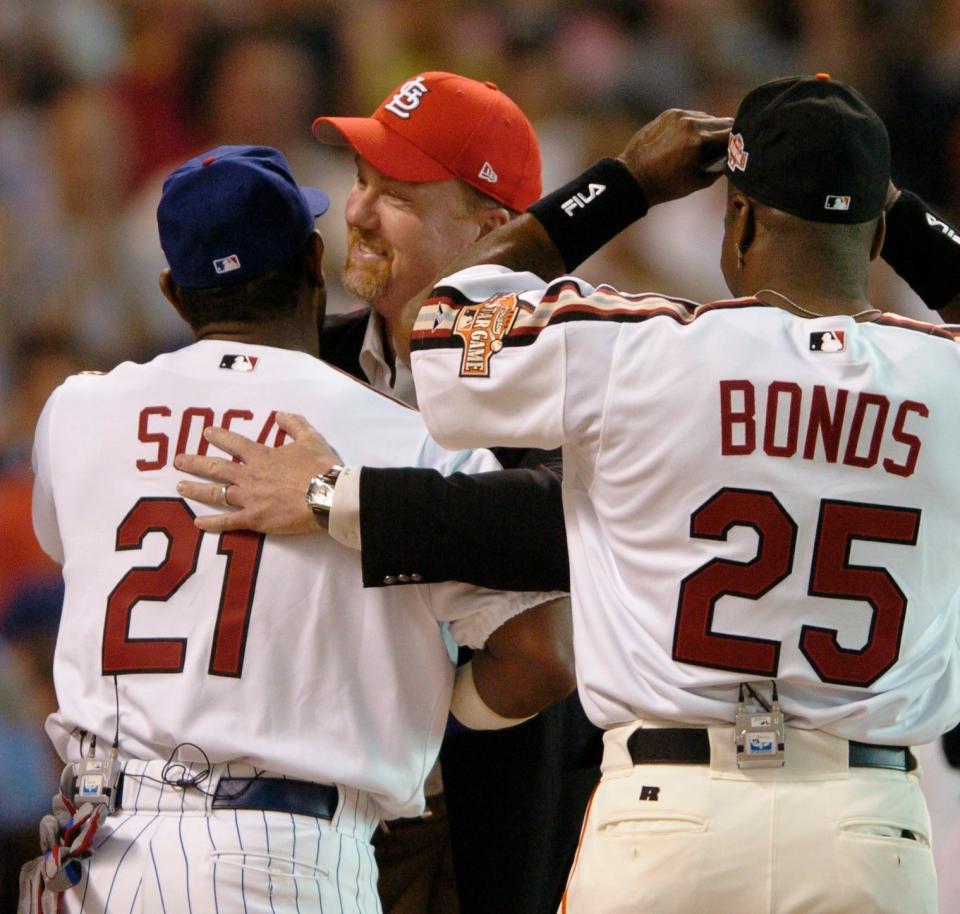
As detailed primarily in the 2006 book "Game of Shadows," Bonds, knowing full well McGwire and Sosa were dabbling – or drowning – in performance-enhancing drug use, decided to get on the PED train himself. His gambit took off in earnest when childhood friend Greg Anderson connected him with BALCO lab founder Victor Conte, and five of the greatest offensive seasons in baseball history ensued.
Yet as stunning as Bonds’ performance was from 2000-2004, including his record-breaking 73-homer season in 2001, he never felt the widespread love in which Big Mac and Sammy basked. When the BALCO scandal unraveled, and Bonds ultimately was dismissed along with McGwire and Sosa for the Hall of Fame, the average fan wondered why he’d stoop to their level.
Well, in 1998, the home run was currency – figuratively, and literally. And that year, the scoreboard said Bonds was the 18th-best player in baseball.
A look at the 17 men – many of them ultimately outed as dopers - who finished above him:
1. Mark McGwire, Cardinals
1998 home runs: 70
Career homers: 583
In the end: McGwire in 2010 admitted to steroid and human growth hormone use, five years after his dodgy testimony before Congress all but convinced the public his run to 70 homers in 1998 was something less than pure.
2. Sammy Sosa, Cubs
1998 home runs: 66
Career homers: 611
In the end: Sosa’s 2005 congressional testimony was equally nebulous and the New York Times reported that Sosa tested positive for a PED during 2003 survey testing that was intended to be anonymous.
3. Ken Griffey Jr., Mariners
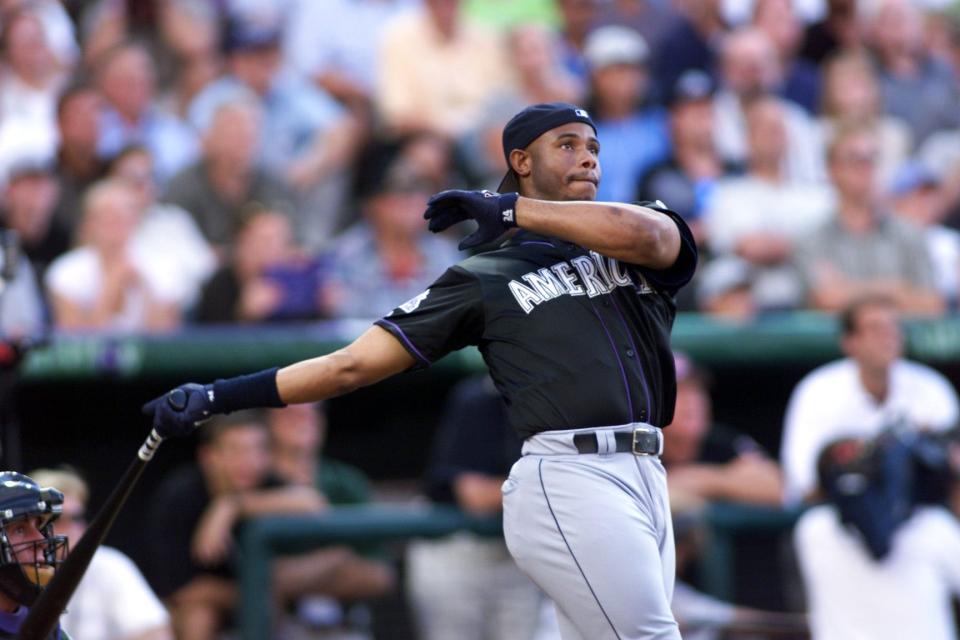
1998 home runs: 56
Career homers: 630
In the end: Griffey was never connected to PED usage and his career stretched into 2010, five years after MLB began drug testing with penalties. He was inducted into the Hall of Fame in 2016.
4. Greg Vaughn, Padres
1998 home runs: 50
Career homers: 355
In the end: Vaughn followed up with a 45-homer campaign with the Cincinnati Reds in 1999; he’d have one more All-Star season in 2001 with Tampa Bay, when he hit 24 home runs, and retired at 37 after the 2003 season.
5. Albert Belle, White Sox
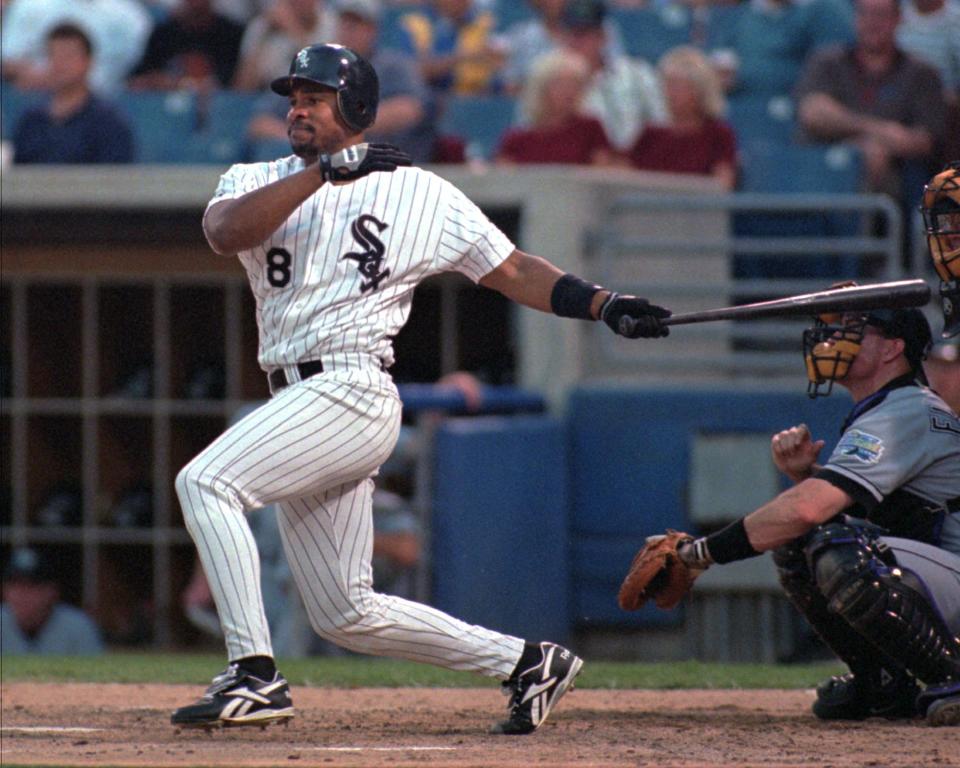
1998 home runs: 49
Career homers: 381
In the end: Belle had three seasons of at least 48 homers; he's denied using PEDs and in 2020 told NBC Sports Chicago he could have hit anywhere from 61 to 73 homers had he used steroids in 1998.
6. Jose Canseco, Blue Jays
1998 home runs: 46
Career homers: 462
In the end: Canseco not only admitted to steroid use, he turned it into a cottage industry, fingering many of his peers as PED users in the best-selling book "Juiced" and saying he injected McGwire with steroids while they were teammates in Oakland.
7. Vinny Castilla, Rockies
1998 home runs: 46
Career homers: 320
In the end: ’98 was Castilla’s third consecutive season of 40-plus home runs, and the last of his two All-Star appearances. Viewed in some quarters as a power product of mile-high Coors Field, Castilla bounced to three teams from 2000-2003 – before returning to Coors Field in 2004 and hitting 35 homers with 131 RBI.
8. Juan Gonzalez, Rangers
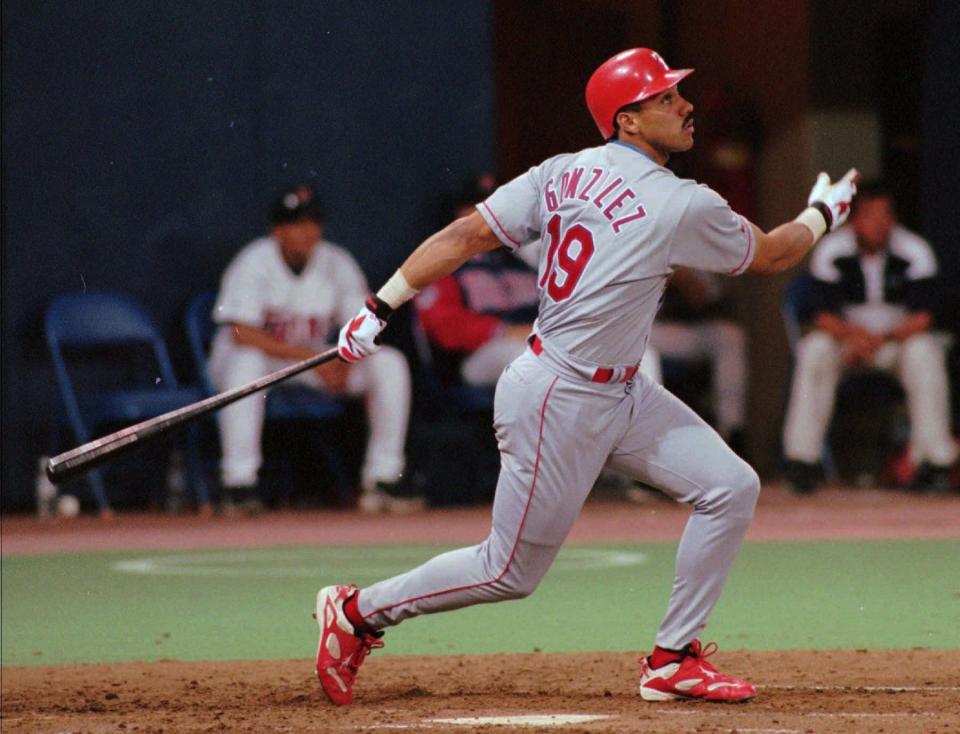
1998 home runs: 45
Career homers: 434
In the end: Gonzalez, who retired after making just one plate appearance due a hamstring injury in 2005, was accused in Canseco’s "Juiced" of being a steroids user and even fingered by former Texas Rangers owner Tom Hicks as performing poorly “after he came off steroids, probably.” The 2007 Mitchell Report reported that a bag that a clubhouse attendant said belonged to Gonzalez contained steroids and syringes; it was flagged during a customs check in Toronto. Gonzalez has denied taking PEDs.
9. Manny Ramirez, Indians
1998 home runs: 45
Career homers: 555
In the end: Ramirez twice tested positive for PEDs, once in 2009 with the Dodgers and again in 2011 with the Rays; he retired rather than serve a 100-game suspension as a second offender. Ramirez also tested positive in 2003 survey testing, according to the New York Times.
10. Andres Galarraga, Braves
1998 home runs: 44
Career homers: 399
In the end: Galarraga proved he wasn’t just a Coors Field reclamation project, hitting those 44 homers in Atlanta after 47- and 41-homer seasons at altitude.
11. Rafael Palmeiro, Orioles
1998 home runs: 43
Career homers: 569
In the end: Perhaps the most tragic figure of the steroid era, Palmeiro was, according to "Juiced," turned on to steroids by Canseco; Palmeiro added a finger-pointing dash of vehemence to his denial of PED usage before Congress in 2005. At age 37, Palmeiro would hit 43 homers in 2002 – the last season before any drug testing – and just 18 in 2005. In July of that season, four months after his seemingly credulous congressional testimony, he tested positive for stanolozol.
12. Alex Rodriguez, Mariners
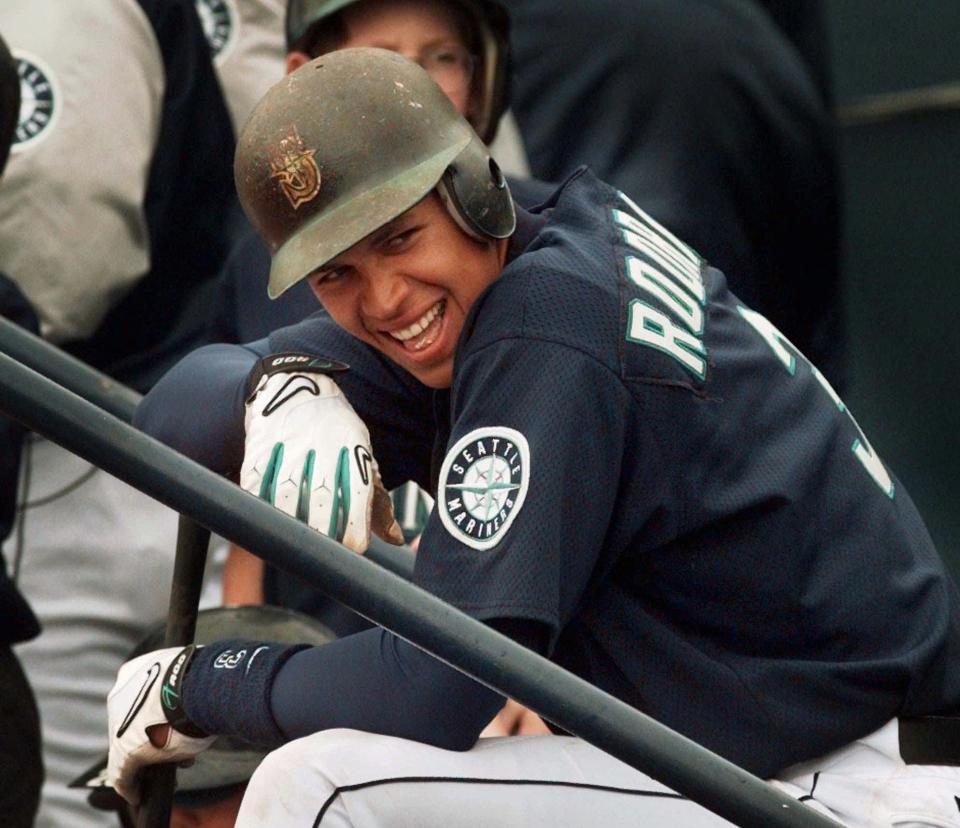
1998 home runs: 42
Career homers: 696
In the end: The youngest player on this list at 22, A-Rod ultimately became the most steroid-smeared of the bunch, admitting to doping as a Ranger from 2001-2003 and getting ensnared in the Biogenesis scandal in the 2010s, earning a yearlong suspension. The latter flap came after he allegedly “came clean” about his PED usage in 2009, when Sports Illustrated reported his positive test with the Rangers. To say doubt is cast on the entirety of his career accomplishments may be an understatement.
13. Mo Vaughn, Rd Sox
1998 home runs: 40
Career homers: 328
In the end: Vaughn in 2001 wrote three checks for human growth hormone to former clubhouse attendant Kirk Radomski, as noted in the Mitchell Report. His 40 homers in '98 came in his final season in Boston, and after years of injury, he retired at 35 in 2003.
T-14. Moises Alou, Astros
1998 home runs: 38
Career homers: 332
In the end: Alou topped that ’98 season with the Astros just once, hitting 39 homers for the Cubs in 2004. He made the last of his six All-Star appearances at 38, with the Giants, and retired at 41 after playing 15 games with the Mets in 2008.
T-14. Jeromy Burnitz, Brewers
1998 home runs: 38
Career homers: 315
In the end: Burnitz’s career year in ’98 was the first of four consecutive 30-homer seasons, all with Milwaukee, and he hit 37 with the Rockies in 2004.
T-14. Carlos Delgado, Blue Jays
1998 home runs: 38
Career homers: 473
In the end: Delgado would hit a career-high 44 homers a year later and, at 36, hit 38 homers for the Mets in 2008.
T-14. Vladimir Guerrero, Expos
1998 home runs: 38
Career homers: 449
In the end: Vlad Sr. and Griffey are the lone Hall of Famers on this list, as Guerrero was just 23 in ’98, the first of nine 30-homer campaigns. At 35, he was still producing at an All-Star and Silver Slugger level and retired a year later, in 2011.
18. Barry Bonds, Giants
1998 home runs: 37
Career homers: 762
In the end: Eventually, Bonds would take a backseat to nobody; this year, he was merely an afterthought, wedged just above Nomar Garciaparra and Shawn Green on the home run list. Bonds would rectify that, and ultimately, perhaps no legacy was more greatly altered in the wake of the great home run chase.
This article originally appeared on USA TODAY: Barry Bonds was forgotten man in McGwire-Sosa Home Run Chase of 1998

